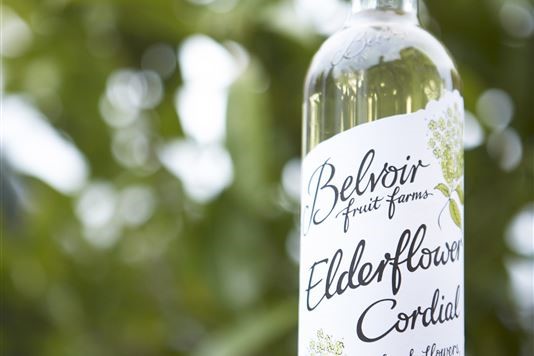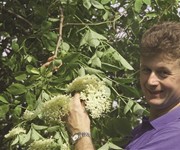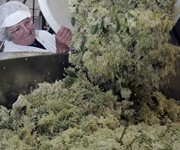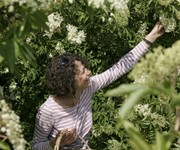Belvoir Fruit Farms: how elderflower cordial built a business

A mother's homemade recipe led to a thriving business. We talk to the man in charge of Belvoir Fruit Farms (who happens to be her son), Pev Manners.
Belvoir Fruit Farms, pronounced 'bee-ver' and based in the Lincolnshire countryside, manufactures over 40 different types of cordials, pressés and still drinks, all of which are made and bottled on site. You’re bound to have spotted them in Waitrose, Tesco, Asda or indeed Sainsbury’s, and I always have a bottle of Belvoir elderflower cordial at the ready on my desk.
It's a family affair
 Pev Manners (pictured left) is the man in charge, and it was his mother Lady Mary Manners (“a lovely woman – so much fun,” said Pev) who invented their now-bestselling recipe for elderflower cordial way back in the 1950s. “She used to make it all the time, and we use the exact same recipe today,” Pev told me. “If it hadn’t been for her, there’d certainly be no Belvoir business to speak of now.”
Pev Manners (pictured left) is the man in charge, and it was his mother Lady Mary Manners (“a lovely woman – so much fun,” said Pev) who invented their now-bestselling recipe for elderflower cordial way back in the 1950s. “She used to make it all the time, and we use the exact same recipe today,” Pev told me. “If it hadn’t been for her, there’d certainly be no Belvoir business to speak of now.”
It was 1984 when Pev’s father, Lord John Manners, decided that something must be done about all the surplus strawberries and the like which were produced on the family’s fruit farm. Inspiration struck when Lord Manners remembered that, a year earlier, his wife had made 40 bottles of her famous elderflower cordial, all but two of which were left for the family to enjoy.
“My mother’s cordial was incredibly popular with the locals and it was always being bought, borrowed or stolen! My father decided that cordials could be the makings of a profitable business, and so as well as our existing fruits we started to grow elderflower at the farm too. Both my parents got stuck in with the digging,” Pev recalls.
Five simple ingredients
 By 1992 the family had a range of seven cordials to their name, adding sparkling drinks to the collection in 1997. “We can’t stop making drinks now,” said Pev. “We have lots of cordials, organic cordials, pressés, punches and still drinks, some of which are only for the winter season, such as apple, plum and cinnamon cordial.”
By 1992 the family had a range of seven cordials to their name, adding sparkling drinks to the collection in 1997. “We can’t stop making drinks now,” said Pev. “We have lots of cordials, organic cordials, pressés, punches and still drinks, some of which are only for the winter season, such as apple, plum and cinnamon cordial.”
As for how it’s made – well, that’s simple. “Our drinks are produced in a very traditional way, and we don’t add any preservatives or the like to them. All you do is combine syrup (sugar and water), fresh lemons, citric acid, and lots of stalk-free elderflowers; then you steep it like a teabag for at least a day, before carefully filtering it. We’ve got massive stainless steel cheese vats on the farm to do that for us, but if you’re making it at home muslin would work well too.”
“It used to be me who picked the elderflowers,” said Pev. “But now we advertise over the local area for people to bring it to us, a service which we pay handsomely for. This year we got 43 tonnes of elderflower delivered to us in four and a half weeks! The elderflower grown on the farm here is now only used for our organic elderflower drinks.”
'Like a fine Sauvignon Blanc'
 Despite an abundance of different fruits in their range, Belvoir’s elderflower pressé is still the biggest seller – last year the firm sold around two million little bottles of the stuff. So what is it about elderflower that gets everybody’s juices going? “It’s just so refreshing, because of its lemonade base,” said Pev. “It’s got a lovely, complex taste – rather like a fine Sauvignon Blanc. It’s adding sugar which makes the magic happen, and we’re not ashamed to say that there is a bit of sugar in our drinks. We stick to traditional methods, and you have to have sugar to make a proper elderflower cordial.”
Despite an abundance of different fruits in their range, Belvoir’s elderflower pressé is still the biggest seller – last year the firm sold around two million little bottles of the stuff. So what is it about elderflower that gets everybody’s juices going? “It’s just so refreshing, because of its lemonade base,” said Pev. “It’s got a lovely, complex taste – rather like a fine Sauvignon Blanc. It’s adding sugar which makes the magic happen, and we’re not ashamed to say that there is a bit of sugar in our drinks. We stick to traditional methods, and you have to have sugar to make a proper elderflower cordial.”
For more information, or to buy their drinks online, visit the Belvoir website.
You might also like
Comments
Be the first to comment
Do you want to comment on this article? You need to be signed in for this feature